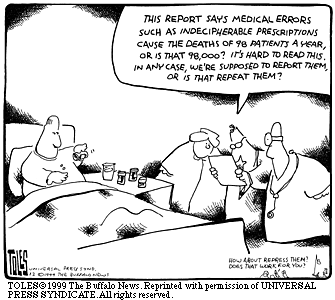The Germanwings catastrophe raises, again, the question of whether "the fox can guard the chicken house?"
In two articles last week I pleaded for innovative solutions to certain problems of public safety, which generally have been left in the hands of professional and trade associations or left to the government to impose (often additional) mandatory reporting requirements when there is little evidence of their effectiveness to begin with. My less than inclusive list of those upon whom we place our safety, every day, included doctors, nurses, pilots, uniform personnel (police, fire and EMTs) and bus and train drivers.
Dr. Donald Berwick, former Administrator of The Centers for Medicare and Medicaid (CMS) in the Obama administration, also published last week a Viewpoint in The Journal of The American Medical Association. He pleaded for health care leaders "taking the helm," for change "from the inside out." Berwick and his colleagues urged that the next phase of U.S. health care reform, recognizing the essential platform that the Affordable Care Act (ACA) created, rests with medical leaders, not more government laws or regulations. While I have had the great fortune of knowing Dr. Berwick our parallel pleas were in no way coordinated, except perhaps from a common view of what needs to lie ahead.
When on the faculty of Harvard Medical School (HMS), I was a senior consulting psychiatrist to its self-insured malpractice company (The Harvard Risk Management Foundation that covered its hospitals). I saw, again and again, that among the most common (and correctable) problems doctors have is their getting defensive and circling their wagons after something bad happens to a patient. In 2006, Dr. Lucian Leape, a world leader in patient safety, led a group of HMS leaders and issued a manual about medical errors -- about how to improve safety and about how to apologize. One irony conveyed in this report was that doctors would be less likely to be sued if they took control (from lawyers and government regulators) and assumed responsibility for their actions. Patients liked that too.
What goes around can come around.
When will professions and trade associations step forward and say they want to find solutions (with zero deaths as their goal) when patient safety is at risk as a result of medical conditions, including physical illnesses and mental and substance use disorders that have yet to be effectively treated or are in remission? When will they, like HMS did years ago, convene the best, the brightest and the courageous and engage world renowned problem solving technology and big data companies (like Apple, Google and others) to find feasible ways to identify and solve problems before another tragedy happens because the indicia that herald it went unnoticed or unresponded to?
The U.S. military has begun this type of intelligent design for the Detection and Computational Analysis of Psychological Signals (DCAPS). They want to identify behavioral patterns in pilots that suggest there could be problems and offer help to ensure that people (and expensive jet planes) are protected.
Imagine professional and trade associations, like mine (I belong to both the American Psychiatric Association and the American Medical Association) and those of pilots and others, using the Germanwings disaster to seek better ways for professionals in need of help to be identified and served.
It is a special privilege for someone to be entrusted with the lives of others. That privilege, I believe, should limit the privacy of those whose work directly impacts upon the safety of others. Members of my profession, and others whose work the public must trust, should be asked to consent -- when the technology is good enough and developed by those that will use it (not by government) -- to monitoring that will reliably and privately inform their employers that something is going on and needs to be looked at. What better way to honor the privilege we have been granted?
When I have talked about this notion of professions and trades actually leading, changing from the inside out, with technical capabilities that heretofore were not possible, many have reacted with incredulity, even outrage. It was as if my proposal might be even less plausible, less "modest" if you will, than Jonathan Swift's that the poor sell their economically burdensome children to the rich as food (A Modest Proposal, 1729).
So I was heartened by Dr. Berwick's ideas, reminded of Dr. Leape's leadership, and hopeful that this time, out of the ashes of a deadly crash, will rise a fresh spirit of problem-solving and responsibility among those sanctioned to bear our trust. That might make a lot more people safer, and earn these service workers the dignity their jobs so richly deserve.
_______________
The views expressed here are entirely my own. I take no support from any pharmaceutical or device company.
Dr. Sederer's book for families who have a member with a mental illness is The Family Guide to Mental Health Care (Foreword by Glenn Close) - is now available in paperback.
